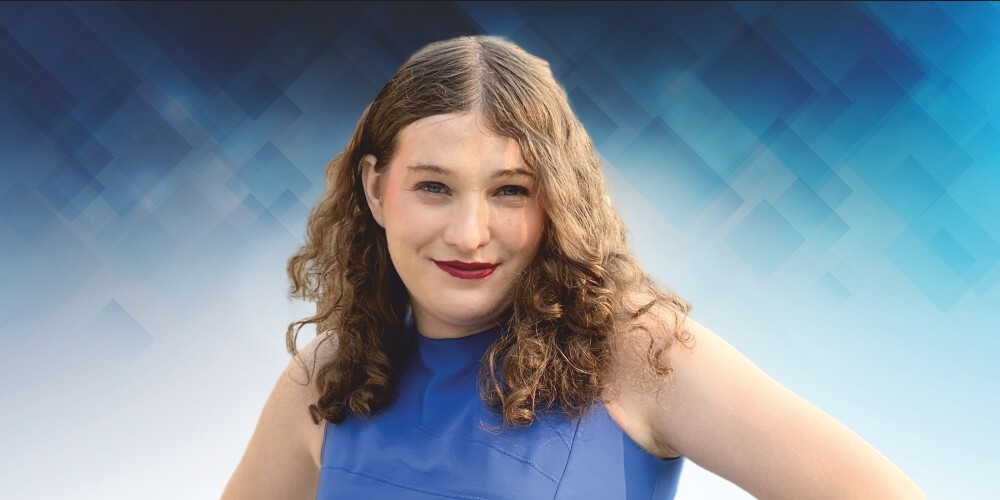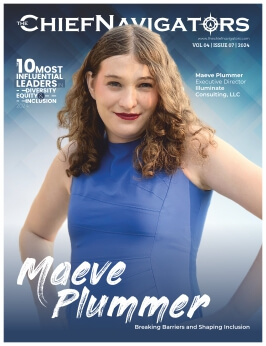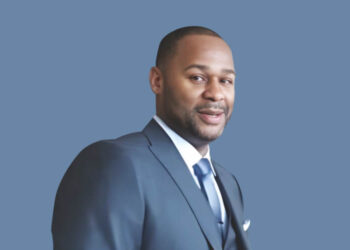Maeve Plummer: Breaking Barriers And Shaping Inclusion
The 10 Most Influential Leaders in Diversity, Equity, & Inclusion, 2024

From an upbringing in a small town in rural Pennsylvania to the forefront of the fight for equality and inclusion, Maeve Plummer‘s path has been anything but ordinary. Growing up in a traditional Catholic family as a queer and transgender person, Maeve quickly became aware of how natural variations in the human experience can often be misunderstood and why advocates and bridge-builders are so essential to a more inclusive world.
Many more moments have shaped Maeve’s trajectory into mission-driven work and the diversity, equity, and inclusion (DEI) field. Maeve’s journey towards advocating for equity and inclusion began on her undergraduate university campus, College of the Holy Cross, where she immersed herself in LGBTQIA2+ programming, activism, and education. With determination and unwavering commitment, she brought about transformative changes at her alma mater.
In 2015, Maeve’s efforts led to the student Pride organization hosting its first-ever campus-sanctioned drag show featuring the renowned artist Shangela from RuPaul’s Drag Race as the headliner. Moreover, her activism prompted Holy Cross to become one of the first Catholic universities in the United States to offer gender-inclusive housing accommodations. By challenging existing policies as a transgender individual, Maeve successfully lived with her close friends who were women during her senior year. The groundbreaking change gained widespread attention and was covered by the Daily Beast.
Later, Maeve joined the Digital Transgender Archive team, immersing herself in the history of transgender activism, community-building, and memorialization. Exploring primary accounts and publications from transgender pioneers who had tirelessly worked to create a more inclusive world inspired her deeply. It was a profound realization that ignited a fire within her, propelling her to become part of the rich history of activism and social change.
Following her time with the Digital Transgender Archive, Maeve worked for Out & Equal, a nonprofit organization dedicated to fostering global workplace inclusion for LGBTQIA2+ professionals, which further illuminated her path and fueled her passion. Through her involvement with Out & Equal, Maeve had the privilege of connecting with inspiring leaders in diversity, equity, and inclusion (DEI). Conferences hosted by Out & Equal drew thousands of LGBTQIA2+ professionals and allies, Employee Resource Group (ERG) leaders, and, most importantly, DEI subject matter experts.
These conferences provided her with firsthand experiences of professionals driving change. During these encounters, Maeve’s horizons expanded, and she realized her desire to address bias, exclusion, and injustice for all individuals in the workplace, taking a more intersectional outlook beyond just LGBTQIA2+ inclusion.
Everything seemed to fall into place when she received the opportunity to work with Feminuity, a full-service diversity, equity, and inclusion (DEI) consulting firm serving clients of all sizes and sectors, and with the launch of her own DEI organization, Illuminate Consulting LLC.
The Power of Interdisciplinary Expertise
Equipped with an academic background in Sociology, Gender & Sexuality Studies, and Comparative Social Policy, Maeve brings a unique perspective to her work as a DEI practitioner. Maeve often combines insights from these academic fields with industry-specific research to effectively communicate and resonate with workplace leaders.
Maeve’s academic training has enabled her to offer insights on various forms of inequity, extending beyond her personal lived experiences as a neurodivergent, queer, and transgender individual. Embracing a broader perspective, she contributes value across different DEI focus areas, avoiding the limitation of solely addressing issues that align with her own identities. The interdisciplinary nature of her training empowers her with agility and a well-rounded approach to tackle the multifaceted aspects of diversity, equity, and inclusion.
Beyond Lived Experience
According to Maeve, it is important to recognize that simply having specific non-dominant lived experiences does not automatically qualify someone to lead diversity, equity, and inclusion programs. Such an approach tends to tokenize marginalized and underrepresented groups, placing additional burdens on them without proper compensation.
Maeve believes that while lived experiences are undoubtedly valuable and should shape DEI approaches, effective DEI leaders require a unique skill set in order to make a significant impact. These leaders should possess the ability to handle complexity, navigate conflicts, and facilitate challenging conversations about privilege, inequity, and injustice. They should be capable of conveying nuanced insights from various academic and non-academic disciplines, community groups, and thought leaders in ways that are accessible and easily understood by individuals with varying levels of education and familiarity with DEI. Additionally, they should demonstrate humility and maintain a growth mindset, always willing to listen to new perspectives and reevaluate their actions and beliefs based on new information or constructive feedback.
In Maeve’s view, the most crucial characteristic of an effective DEI leader is their ability to move beyond abstraction and buzzwords. They should demonstrate valuable expertise that translates into actionable systems, methods, programs, policies, and practices, ultimately improving the lives of non-dominant groups and consumers while fostering long-term change.
Efforts to Foster Understanding and Inclusivity in DEI
Maeve frequently encounters misconceptions and myths surrounding diversity, equity, and inclusion in her field. One common misconception is the belief that DEI targets specific groups, such as white men, leading to feelings of threat. However, Maeve emphasizes that DEI work is for everyone, as every individual has aspects of their identity that they wish others were more aware of and inclusive towards in the workplace and beyond. The core of DEI is fairness, and practitioners aim to address any form of meaningful unfairness, regardless of someone’s identity.
Another misconception is that DEI is solely a product of leftist ideology and indoctrination. Maeve clarifies that DEI intentionally rejects partisanship and instead embraces nuance and wades into ambiguity. It encourages individuals to be kind, empathetic, curious, and considerate human beings. DEI revolves around shared values such as inclusion, human rights, and equal opportunity, which are supported to some extent by everyone. It prompts us to reflect on how we can better embody these values in our workplaces.
To tackle these challenges, Maeve takes an approach that encourages open dialogue and invites participants in her trainings or workshops to express their skepticism, hesitations, and fears related to DEI. She acknowledges that these concerns are natural and expected. As a trained subject matter expert in DEI, Maeve strives to address these questions earnestly and foster greater understanding and buy-in for the goals and objectives of DEI.
Call for Design Thinking and Iterative Approaches
Maeve believes that a one-size-fits-all approach cannot effectively address DEI challenges in every organization. Instead, adopting a design thinking mindset is crucial. Design thinking allows for the identification of unique growth opportunities within each organization and tailoring approaches that consider realistic factors such as organizational size, structure, budget, industry, and regional context.
DEI initiatives require an iterative mindset, meaning that organizations must be open to proposing and implementing new strategies while being willing to evaluate and adjust them based on their outcomes. This flexibility allows for continuous improvement and adaptation to meet the specific needs and circumstances of the organization. By embracing an iterative approach, organizations can make progress in their DEI efforts and foster a culture of ongoing learning and development.
Cultivating Empathy and Understanding in DEI Discussions
Maeve recognizes that in DEI conversations, it can be more impactful to share personal experiences and emotions rather than relying solely on abstract statements such as labeling something as “problematic” or “outdated.” By expressing how something personally feels and the impact it has on oneself or others, a deeper level of understanding and empathy can be fostered.
When engaging in DEI discussions as the Executive Director of Illuminate Consulting, LLC and the Director of Research and Learning with Feminuity, Maeve aims to move beyond abstract debates that can reinforce rigid beliefs. Instead, she encourages storytelling as a way to connect on a human level. Sharing personal stories helps to create a more receptive environment where people can relate to the experiences of others, understand the impact of certain behaviors or practices, and recognize the importance of treating each other with dignity and respect.
According to Maeve, storytelling, as a fundamental aspect of human connection, holds great value in the field of DEI. It allows for a richer understanding of the many different human experiences that DEI seeks to create awareness and space for in the workplace.. Storytelling creates opportunities for meaningful dialogue that transcends the polarization often seen in wider cultural and political contexts.
Transforming HR through an Inclusive Lens
Maeve highlights that many aspects of HR can benefit from a transformation through a DEI lens. The following are some areas where an inclusive approach can be applied:
- Workplace Leaves: Consider recognizing the non-linear journey of grief in bereavement leave policies and allowing leaves for chosen family, not just those related by blood or legal affinities. This acknowledges the diversity of family structures and support systems.
- Inclusive Perks and Benefits: Offer workplace perks and benefits that address inequities for non-dominant groups. This could include flexible schedules for caregivers, remote work options for individuals with disabilities, tuition reimbursement for young professionals, and menstruation leave for those who experience acute discomfort during menstruation.
- Holiday Substitution Policy: Have a holiday substitution policy that allows individuals from different cultures, spiritualities, and backgrounds to take days off that are meaningful to them, rather than solely observing dominant holidays tied to the Christian calendar.
- Inclusive Dress Codes: Ensure that dress codes are inclusive of different expressions, genders, races, cultures, incomes, sizes, and abilities. Avoid policies that may perpetuate biases or create barriers for certain groups.
Additionally, Maeve emphasizes the importance of collecting Voluntary Self-Identification (Self-ID) data in HR processes. This data, including information on race, gender, ability, sexuality, and more, can provide valuable insights into an organization’s DEI growth opportunities and guide areas of focus for improvement. By collecting this data in applications, employee profiles, and engagement surveys, organizations can better understand their workforce composition and identify areas for progress.
By adopting these inclusive practices, HR departments can contribute to a more equitable and inclusive workplace environment that recognizes and addresses the diverse needs and experiences of employees.
Inclusive Hiring is Good Business
In response to talent acquisition leaders who insist on hiring the “best person for the job,” Maeve addresses the underlying implication of this statement. She highlights that believing there are no highly capable and qualified individuals from marginalized groups perpetuates the exclusion and underrepresentation they face. Maeve emphasizes that hiring the best person for the job and promoting diversity are never mutually exclusive. In fact, individuals from non-dominant groups often bring unique perspectives and innovative ideas that can contribute to an organization’s success in diverse and global markets.
Furthermore, Maeve points out that the significant underrepresentation of certain groups in the workforce indicates the presence of biases in the recruitment and selection processes which are hindering teams from making the best hire. Rethinking and reevaluating these approaches are necessary to address and rectify such biases. By embracing a more inclusive approach to talent acquisition, organizations have the opportunity to tap into a broader talent pool, enhance innovation, and create a more equitable and representative workforce.
The Hidden Dangers of Automation
Maeve points out the issue of automation bias in talent acquisition and diversity, equity, and inclusion (DEI), which has been exacerbated by the rise of large language models and Artificial Intelligence (AI). She highlights that automation does not guarantee objectivity or fairness. In fact, many technologies have been found to perpetuate existing biases in society. This occurs when they are trained on biased datasets or calibrated by biased humans and homogeneous professional groups. Additionally, the complexity of machine learning algorithms often makes it difficult for developers to fully understand and test for biases embedded in the code.
Maeve believes that the future of AI lies in integrating human safeguards and consistently auditing it for biases. Rather than putting our trust completely in technology, it is crucial to critically assess and address potential biases. Companies involved in creating AI must be more mindful and intentional in their approach, actively seeking to mitigate biases and incorporating a diverse range of perspectives throughout the product development process.
By prioritizing human oversight, rigorous bias testing, and input from people of different backgrounds and lived experiences, the potential negative impact of biases in AI can be reduced. This approach ensures that technology serves as a tool to enhance fairness and inclusion, rather than perpetuate existing disparities and injustices.
DEI in Practice
Maeve specializes in a variety of services in the DEI field. Beyond educational workshops, she does a lot of advisory work such as helping organizations develop their own inclusive leadership index to evaluate leaders’ commitment to DEI values, which can be integrated into performance evaluations and career advancement decisions. She has guided organizations in recognizing and addressing unintentional exclusion in their products and services, infusing DEI into the core outputs they share with the world. Additionally, Maeve has conducted comprehensive policy audits, providing organizations with insightful reports highlighting various opportunities for DEI growth within their existing procedures. Through these efforts, she has helped organizations foster inclusive leadership, enhance their offerings, and identify areas for improvement in their policies and practices.
Concrete Actions that Propel Diversity, Equity, and Inclusion
Maeve advises companies to take concrete actions to propel diversity, equity, and inclusion (DEI) by collecting data, benchmarking their progress, and setting tangible goals and metrics. She emphasizes that DEI work goes beyond aspirational thinking; it is about creating sustainable and measurable impacts within the workplace and among teams. It is essential
for organizations to view DEI as a necessity rather than a mere preference, and for the entire team to understand that DEI is a top priority. Without this mindset and commitment, meaningful progress is unlikely to be achieved.
Maeve emphasizes that for real progress to occur, organizations must view DEI as an essential component of their operations and prioritize it accordingly. This commitment, combined with data-informed approaches and thoughtful and consistent efforts to achieve goals, lays the foundation for creating lasting and impactful change in the workplace.
Company Website: Feminuity



